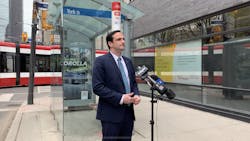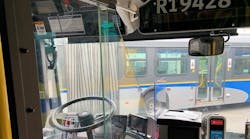CUTA continues to press Canadian government for transit funding relief
Canada has provided emergency financial support for several sectors, but public transit has not been one thus far. The lack of relief, even as the industry has experienced declines in ridership and revenue, yet continued to provide essential service, has the Canadian Urban Transit Association (CUTA) asking a simple question: Why?
CUTA says despite transit’s critical role in getting essential workers to work in hospitals, nursing homes and grocery stores, the federal government has yet to agree to provide emergency financial support. But non-essential modes of transport that are disproportionately used by elective, higher-income travelers have received federal support.
“The people we rely on to keep hospitals clean and grocery stores open take transit to work. Transit is essential because they are essential,” said Marco D’Angelo, CEO of CUTA. “But we cannot keep delivering our essential service in a timely way without federal support soon. And we do not understand why Air Canada receives help, but vital transit service does not.”
He added CUTA does not oppose helping airlines, but assisting only non-essential transport makes no sense.
Across Canada, ridership is down by about 90 percent and revenue is down even more as measures such as rear-door boarding to keep operators safe result in fare collection being suspended. Thousands of transit workers have been laid off nationwide and route reductions are widespread.
Metro Vancouver’s TransLink is losing C$75 million (US$54.01 million) per month and implemented a series of service cuts and layoffs. The agency recently announced it would resume fare collection with the installation of a protective barrier between drivers and riders, which will allow it to regain C$2 million (US$1.424 million) per month.
Toronto Transit Commission’s losses of C$90 million (US$63.98 million) per month forced cost cutting measures including layoffs to occur and the city of Edmonton recently laid off 900 employees, nearly half of which were transit operators.
D’Angelo says any further service reductions would hurt lower-income essential workers the most, through longer waits to get home and more crowded vehicles. The association notes other countries, including the United States, Britain and Hong Kong, have included public transit in emergency relief packages.
At the end of March, CUTA formally sent a request to the Canadian government asking for financial aid that includes C$400 million (US$283.58 million) per month to help systems recoup lost revenue.

Mischa Wanek-Libman | Group Editorial Director
Mischa Wanek-Libman is director of communications with Transdev North America. She has more than 20 years of experience working in the transportation industry covering construction projects, engineering challenges, transit and rail operations and best practices.
Wanek-Libman has held top editorial positions at freight rail and public transportation business-to-business publications including as editor-in-chief and editorial director of Mass Transit from 2018-2024. She has been recognized for editorial excellence through her individual work, as well as for collaborative content.
She is an active member of the American Public Transportation Association's Marketing and Communications Committee and served 14 years as a Board Observer on the National Railroad Construction and Maintenance Association (NRC) Board of Directors.
She is a graduate of Drake University in Des Moines, Iowa, where she earned a Bachelor of Arts degree in Journalism and Mass Communication.






